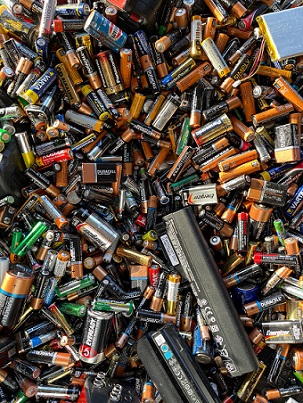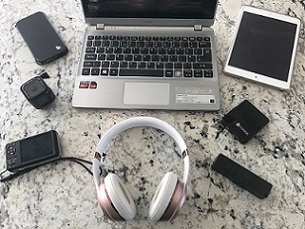 Old lithium-ion batteries. Photo by John Cameron on Unsplash.
Old lithium-ion batteries. Photo by John Cameron on Unsplash.
 An AvSax battery fire mitigation bag
An AvSax battery fire mitigation bag
 All these personal electronic devices are powered by lithium-ion batteries
All these personal electronic devices are powered by lithium-ion batteries
Almost half of all fires at waste transfer stations in the UK are caused by lithium-ion batteries, it has been revealed.
The blazes are costing the country’s economy around £158m a year and can be very difficult to extinguish so perhaps the only way to solve the problems is to ban people from putting batteries in their general waste.
The report by Eunomia Research & Consulting and the Environmental Services Association (ESA) called Cutting Lithium-ion Battery Fires in the Waste Industry suggests that around 200 waste fires are caused by lithium-ion batteries every year in the UK, with damaging consequences for both the environment and society.
In the USA the problem is also huge with online waste magazine Waste 360 reporting: “Since Eunomia’s study only blamed lithium-ion batteries for about 50% of fires, which is in line with past US surveys, the cost borne by our waste and recycling operators is realistically and conservatively about US$2.5 billion annually. “
Li-ion batteries are in just about every personal electronic device from mobile phones and laptops to e-cigarettes, electric toothbrushes and toys.
The trouble is they are thrown into the general rubbish and once they become crushed or damaged can ignite in a process known as thermal runaway which can spark an intense fire among other flammable waste. Thermal runaway happens when one cell in a battery overheats it can produce enough heat – up to 900°C (1652°F) – to cause adjacent cells to overheat and the battery can literally spurt flame out.
These kind of waste fires burn for days and sometimes even weeks or months so the environmental damage is extensive with harmful greenhouse gas emissions released into the atmosphere and water pollution caused by run-off from extinguishing the fires.
When fire incidents sparked by lithium-ion batteries happen in the confined space of an aircraft – and it does every month – it could have catastrophic consequences which is why many planes worldwide are equipped AvSax battery fire mitigation bags which are used to cool and contain the device.
AvSax won the prestigious Queen’s Award for Enterprise in the UK in 2018 and the company is now taking its technology into solving lithium-ion battery fires to other industries such as waste transfer stations and electric cars.
The report reveals that the problem of waste fires sparked by lithium-ion batteries is set to worsen with an ever-increasing number of lithium-ion batteries being used in gadgets and old ones being thrown away.
Of the 670 fires recorded by ESA waste management members across the UK in 2019-20, 38% were either caused by lithium-ion batteries or ‘suspected’ to have been.
This is higher than the percentages recorded in the previous three years (21% in 2016-17, 25% in 2017-18 and 22% in 2018-19).
To reduce these growing numbers of fires, the report identifies a number of solutions to get Li-ion batteries out of our waste. These include banning Li-ion batteries from general waste, having a deposit scheme so people get money back for batteries they hand in or making battery manufacturers pay for the costs of dealing with fires their products cause.
The report’s author, Sophie Crossette, said: “The findings of this research highlight the significant financial burden Li-ion battery waste fires place on the waste sector and public sector services. To date, much of the focus on preventing waste fires has been on improved controls and infrastructure at waste sites. As this report suggests, we now need to focus on interventions to divert batteries from the mixed waste stream to tackle this growing issue.
“If we don’t start to take action now, the increased use of Li-ion batteries will only increase the cost and impact of Li-ion battery waste fires in the years to come.”